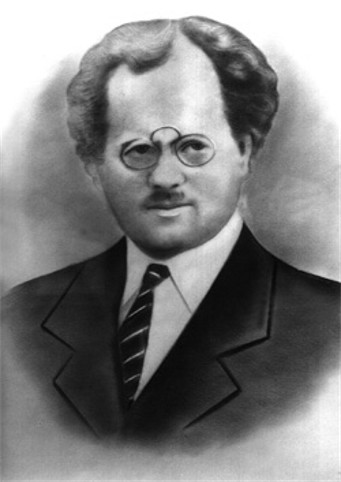Turiansky, Osyp
Turiansky, Osyp [Турянський, Осип; Turjans’kyj] (pseud: I. Dumka), b 22 February 1880 in Ohliadiv, Radekhiv county, Galicia, d 28 March 1933 in Lviv. (Photo: Osyp Turiansky.) An academically gifted son of an illiterate peasant, Turiansky obtained his secondary education in the Academic Gymnasium of Lviv and continued his studies in the philosophy department at Vienna University, from which graduated with a doctoral degree in 1907. While in Vienna he took an active part in the activities of the Sich student society of Vienna and in 1908 published his first stories (novellas) in the society’s almanac. In 1908–9 he edited the monthly Ukrainische Rundschau. In 1910 Turiansky moved to Peremyshl and worked as a teacher in the Peremyshl State Gymnasium.
Following the outbreak of the First World War, he was conscripted into the Austrian army in the fall of 1914 and sent to the front in Serbia. Captured by the Serbs in 1915, he was among the small number of survivors of a convoy of sixty thousand prisoners of war led in the harsh winter conditions through the mountains of Albania. Barely revived from a near-death state, Turiansky used this terrifying ordeal as a basis for his autobiographical antiwar novel Poza mezhamy boliu (Beyond the Limits of Pain). Written in 1917 in the prisoner of war camp on the island of Elba and influenced by expressionist literary tradition, the novel was published in the German translation and was enthusiastically received by German and Austrian literary critics as one of the most remarkable European antiwar novels. For a few years, the writer, who lived in Vienna at the time and lectured at Vienna University, became a minor literary celebrity.
His short-lived European fame was not, however, recognized in his native Galicia. After he returned there in 1923, his literary works were largely ignored while his political views and outspoken societal criticism were condemned, particularly in the nationalist circles. Initially Turiansky worked as a director of a gymnasium in Yavoriv, and later in Drohobych, but was compelled to quit his job in 1927. Subsequently he worked as a teacher in a Polish gymnasium in Lviv. In the late 1920s and early 1930s Turiansky contributed to the left-wing Lviv journal Novi shliakhy.
His literary works, none of which has matched the brilliance of his first novel, include the novelettes Duma pralisu (Duma of the Primeval Forest, 1922), the novel Syn zemli (Son of the Soil, 1933), the story collection Borot’ba za velykist’ (The Struggle for Greatness, 1926), and the satirical comedy Raby (Slaves, 1927). The English translation of Poza mezhamy boliu was published as Lost Shadows in New York in 1935. Turiansky’s literary oeuvre was suppressed in Soviet Ukraine and the first postwar edition of his prose was published in Kyiv in 1989.
Marko Robert Stech
[This article was updated in 2010.]

.jpg)
